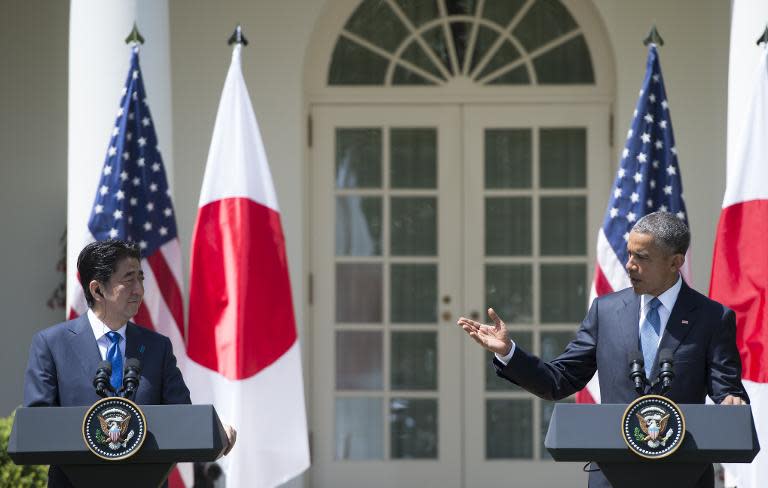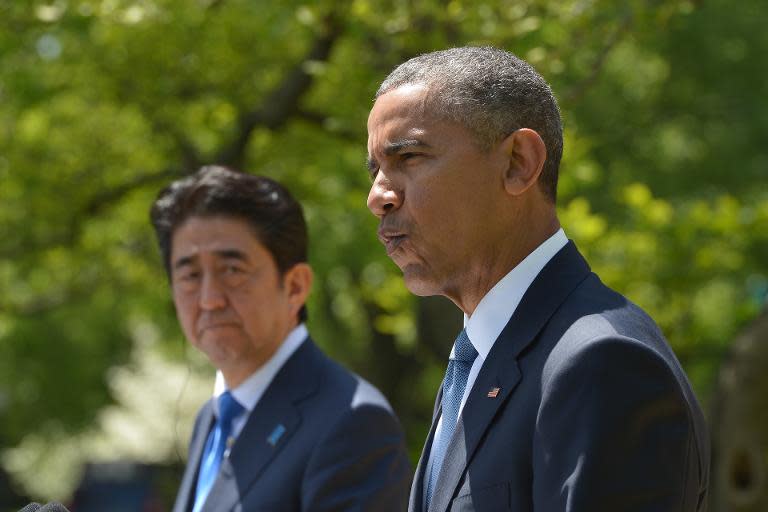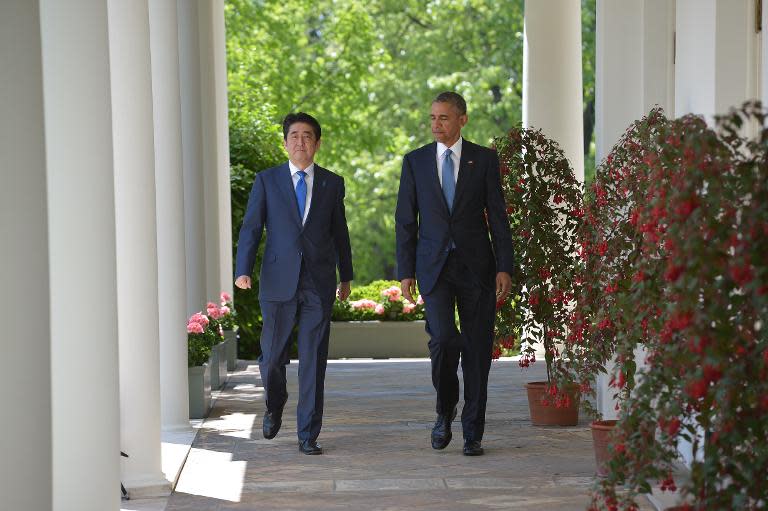Obama, Abe revitalize ties as China 'flexes muscles'
The United States and Japan sought to reinvigorate their 70-year alliance in the face of China's growing clout Tuesday, with President Barack Obama welcoming Prime Minister Shinzo Abe to the White House. Voicing shared anxiety about China's activities in the South and East China Seas, the two leaders vowed to counter new threats and increase joint military deterrence. Obama accused China of "flexing their muscles" though territorial claims and the building of new islands in disputed waters. "There are some real tensions that have arisen with China around its approach to maritime issues and its claims," Obama said. Many experts believe the oil-rich maritime region -- a mosaic of historical territorial claims -- could be a flashpoint for conflict. The US president reiterated his "absolute" commitment to Japan's defense and stressed that pledge "covers all territories under Japan's administration, including Senkaku Islands." Beijing lays claim to the island chain it calls the Diaoyu. Now for the first time that US defense assurance will be reciprocated, thanks to a deal signed during Abe's visit. Japan's well-trained and well-equipped forces will be able to come to the defense of the United States, a dramatically more assertive security role for the officially long-pacifist country. But, Obama insisted, "we don't think that a strong US-Japan alliance should be seen as a provocation." "We welcome China's peaceful rise." - 'Deeply pained' - Abe and Obama also pledged to forge ahead with a Trans-Pacific trade deal that would encompass 12 countries and 40 percent of the world economy, but which does not include Beijing. China has increasingly been making its economic prowess felt, pushing hard for the creation of an Asian Infrastructure Investment Bank to rival US-backed institutions. Obama denied that the United States opposed the bank, but said transparency was essential. "What we don't want to do is just be participating in something and providing cover for an institution that does not end up doing right by its people," he said. During a joint press conference, Abe expressed his remorse over the sexual slavery of Asian women during World War II in Japanese military brothels -- a deeply emotive issue in China and South Korea -- but stopped short of issuing his own apology. "I am deeply pained to think about the 'comfort women' who experienced immeasurable pain and suffering as a result of victimization due to human trafficking," Abe said. Mainstream historians say an estimated 200,000 women from Korea, China and other Asian nations were systematically raped by Japan's imperial forces. Abe -- who would like to move beyond Japan's checkered past -- has been under fierce pressure to repeat the apologies of his predecessors. He has also enraged South Korea and China by visiting controversial war shrines. And some of Abe's right-wing supporters have poured fuel on the fire by alleging some of the so-called "comfort women" were common prostitutes, and are fighting a vigorous rear-guard battle to alter the narrative. South Korean President Park Geun-Hye as recently as Sunday warned "time is running out" for Tokyo to apologize. Abe and Park -- who will visit the White House soon -- have not met for a formal two-way summit since they took power in 2012 and 2013 respectively. The issue has become a major diplomatic obstacle for Washington. The White House would like to see better ties between South Korea and Japan, a potential democratic alliance that could serve as a powerful counterbalance to China. - Historic address - Abe's reluctance to say sorry may yet become a political problem for Obama. Abe will on Wednesday become the first Japanese prime minister to address a joint session of the US Congress. Some US lawmakers -- many with large Korean-American constituencies -- have been highly vocal in their demands for an apology. Congress is currently weighing whether to give Obama the means to reach a trade deal with Japan and 10 other nations in the Pacific. A tight vote is expected. During the White House visit, Obama held Oval Office talks with Abe and offered a welcome normally reserved for royalty or heads of state. That included a full arrival ceremony on the South Lawn and a luxurious state dinner on Tuesday evening. On Monday, Obama took Abe on an unannounced tour of the Lincoln Memorial, riding together in Obama's armored limousine -- "the beast" -- to underscore their personal ties. "Walking together with you at the Lincoln Memorial, which has witnessed America tread the path of democracy, will be an extraordinary memory to be cherished," Abe said.

 Yahoo Finance
Yahoo Finance 


